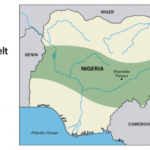A recent survey of demographic, geographic and socio-economic status of Persons with Albinism (PWA) in Nigeria, has shown a geographic concentration in Nigeria’s Middle Belt region.
The Survey, conducted by The Albino Foundation (TAF), and funded by European Union Support for Democracy and Governance in Nigeria (EU-SDGN) Project, shows that the geographical spread extends to the FCT, and further to the North.
According to the report, however, the population spread of PWAs is less likely to be found in the southern part of the country.
In a telephone interview with the News Agency of Nigeria (NAN), Founder TAF, Mr Jake Epelle, said the baseline survey was designed to facilitate a framework for developing support systems to care and protect PWA’s, in Nigeria.
Epelle said the survey was conducted simultaneously in six states of Kogi, Abuja, Lagos, Enugu, Cross River, Kano, Adamawa and the FCT, drawn from the six geo-political zones of the country.
He said from the study, the demographic distribution of PWA in Nigeria showed that there was a higher representation of women living with Albinism than men, with a ratio of 55 per cent to 45 per cent.
It further stratified PWA as 65 per cent Christians, 33 per cent practicing Islam, and a very minute minority of two per cent practicing other forms of religions.
The survey also showed that majority of PWA are single with 63 per cent, married individuals at 32 per cent, while divorced and separated spouses are at two to one per cent.
Epelle explained that several factors that affected PWA adversely included, poor vision, unemployment, limited access to healthcare facilities, skin care solutions, as well as discrimination and low literacy level.
He listed some of the requirements of PWA as healthcare, education, employment opportunities, financial assistance, assistive devices such as sunglasses, face caps and sun screen creams among others, to manage the condition.
Epelle however, decried the non-existence of government welfare programmes to cater to the health and educational needs of PWA, noting that parents, mainly mothers, were the primary care givers for their albino children.
According to him, NGOs such as TAF, Albino Support Groups, and Social Inclusion Groups, were also helping to fill the knowledge, educational, and awareness gaps in managing the condition.
Epelle said discrimination was widely experienced by PWA across the country regardless of background or gender, noting however, that females often reported higher levels of societal discrimination, within the family and friends’ circle than men.
He further acknowledged a general consensus that PWA deserved to be treated specially and differently due to their health challenges, to enable them adjust well into society and harness their potentials.
“It is expected that children living with albinism be given front seat in class to help them have better view of the blackboard.
“They should be given extra time during class test and examination, bearing in mind their sight challenges which puts them at a disadvantage, vis-à-vis their classmates.
“They should be encouraged to take leadership roles, as well as be protected from verbal, physical and other types of assaults from classmates.
“The children should also be monitored in terms of their participation in outdoor activities,’’ Epelle said.
He added that adults living with albinism should also be protected against assaults and threat to their physical bodies, financially empowered to ensure independence and be given equal employment opportunities.
Epelle said PWA should also be equipped with adequate information on proper healthy practices and be posted to duties that would protect them from sun rays. (NAN)

 Join Daily Trust WhatsApp Community For Quick Access To News and Happenings Around You.
Join Daily Trust WhatsApp Community For Quick Access To News and Happenings Around You.

